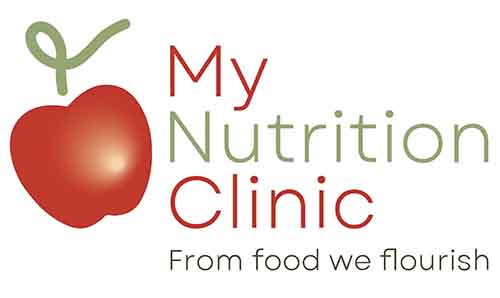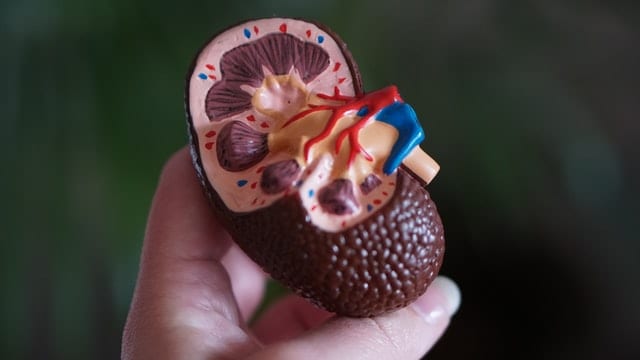Kidney stones are a risk factor for Chronic Kidney Disease (CKD). More than 90% of Australians with CKD are unaware they have the condition. The good news is that healthy dietary choices can help reduce the risk of ever developing CKD, even in those people who have had kidney stones. A diet for YOU which is rich in the right types of fruit, vegetables, and whole grains can help prevent progression of the condition if you do have it. A dietitian can assess your diet, and work WITH you to reduce the risks of kidney stones and CKD, and achieve the optimal health you are after.
There are a number of risk factors for kidney stones but there are many dietary tips to help you minimise them.
Fluid
The simplest thing you can do to prevent kidney stones is to drink MORE FLUID. Two to three litres of fluid every day is the goal and water is the best choice. Drinks such as tea, coffee, wine and beer are acceptable choices in small amounts, but should not be the main fluid source in the diet. Limit fruit juice as this may increase the formation of kidney stones. Develop a habit of drinking 150ml of water (a small glass) every hour while awake. Increase your intake in hot weather or if sweating significantly during exercise.
Food
Food can influence the formation of kidney stones, particularly in those who have had kidney stones in the past. To complicate matters, there are different types of kidney stones depending on the mineral involved. These include calcium oxalate, calcium phosphate, uric acid, cysteine and struvite stones. Specific diet recommendations vary depending on the type of stone involved. Talk to your doctor if you require more information on specific kidney stones.
Dietary intake of animal proteins such as meat, fish and chicken may need to be moderated in certain “at risk” individuals. Everybody is different, so see your doctor and dietitian regarding your individual requirements, but rest-assured, we will make sure you can still enjoy your favourite foods.
Restricting high sodium (salt) foods is often recommended in conjunction with certain drug treatments for kidney stones. This includes avoidance of salted snack foods, salted and/or processed meats, stock cubes, commercial sauces and spreads, commercial ready-made foods, takeaway foods. Use of salt in cooking and at the table is also discouraged. Over 80% of the salt in our diet comes from packet/canned/processed foods, so try to minimize your use of these for one of the easiest ways to reduce the majority of your usual salt intake.
People with a history of calcium oxalate stones are encouraged to avoid foods that raise oxalate levels in the urine. Although many foods contain oxalate, not all need to be restricted. The foods that should be restricted for these certain individuals include –rhubarb, spinach, strawberries, chocolate, wheat bran, nuts, beets and tea.
Too much and too little calcium and vitamin C in the diet can be harmful. Consult your dietitian for your specific requirements if you have or have had kidney stones.
Potassium
Normally, your kidneys excrete most of the excess dietary potassium (approx. 80-90%) to help maintain potassium balance. However, this process becomes compromised as kidney function declines. Found in many of the foods we eat, potassium plays an essential role in muscle contraction and heart function. For this reason, if the kidneys are unable to get rid of high levels of potassium, this can result in a heart attack if not addressed. While not everyone with chronic kidney disease needs to lower their potassium intake. It is worth chatting to your doctor and dietitian whether you should be avoiding this important mineral. All fruits and vegetables contain potassium, but the particularly high potassium choices include bananas, apricots, dates, dried fruits, mangoes, oranges, pawpaws, potatoes, baked beans, broccoli, carrot, pumpkin, spinach, tomatoes, lentils, soups and fruit and vegetable juices. We can help make sure your diet is rich in fruit and vegetables without increasing potassium.
Gender
Men are more likely to develop kidney stones than women as a result of varying causes. There’s not much you can do about gender risk, so it’s an accepted fact that females are the stronger sex when it comes to kidney stones.
Age
While not a definite cause, kidney stones commonly appear between the ages of 20 and 40.
To get more help with kidney stones, book an appointment with our dietitian below.

Dr Jaimon Kelly
Kidney Dietitian
My Nutrition Clinic Kidney Dietitian Dr Jaimon Kelly has a PhD in chronic kidney disease nutrition and has published over 78 publication and authored 2 book chapters on the topics of kidney and chronic disease management through nutrition. He is an experienced educator and is a Research Fellow at the University of Queensland and an Adjunct Assistant Professor at Bond University. Jaimon supervises dietetic student, for both clinic and research placements and delivers GP and nurse training, and public workshops.




